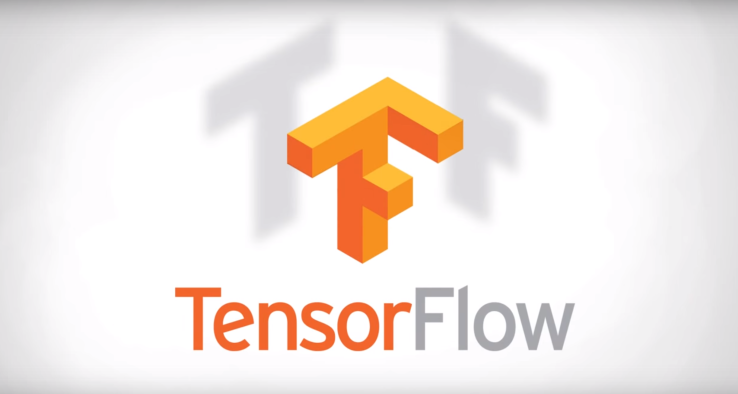TensorFlow
See the following -
A Tour of Google's 2016 Open Source Releases
 Open source software enables Google to build things quickly and efficiently without reinventing the wheel, allowing us to focus on solving new problems. We stand on the shoulders of giants, and we know it. This is why we support open source and make it easy for Googlers to release the projects they're working on internally as open source. We've released more than 20-million lines of open source code to date, including projects such as Android, Angular, Chromium, Kubernetes, and TensorFlow. Our releases also include many projects you may not be familiar with, such as Cartographer, Omnitone, and Yeoman...
Open source software enables Google to build things quickly and efficiently without reinventing the wheel, allowing us to focus on solving new problems. We stand on the shoulders of giants, and we know it. This is why we support open source and make it easy for Googlers to release the projects they're working on internally as open source. We've released more than 20-million lines of open source code to date, including projects such as Android, Angular, Chromium, Kubernetes, and TensorFlow. Our releases also include many projects you may not be familiar with, such as Cartographer, Omnitone, and Yeoman...
- Login to post comments
Artificial Intelligence and Machine Learning Bias has Dangerous Implications
 Algorithms are everywhere in our world, and so is bias. From social media news feeds to streaming service recommendations to online shopping, computer algorithms—specifically, machine learning algorithms—have permeated our day-to-day world. As for bias, we need only examine the 2016 American election to understand how deeply—both implicitly and explicitly—it permeates our society as well. What’s often overlooked, however, is the intersection between these two: bias in computer algorithms themselves. Contrary to what many of us might think, technology is not objective...
Algorithms are everywhere in our world, and so is bias. From social media news feeds to streaming service recommendations to online shopping, computer algorithms—specifically, machine learning algorithms—have permeated our day-to-day world. As for bias, we need only examine the 2016 American election to understand how deeply—both implicitly and explicitly—it permeates our society as well. What’s often overlooked, however, is the intersection between these two: bias in computer algorithms themselves. Contrary to what many of us might think, technology is not objective...
- Login to post comments
Baidu Open Sources Its Deep Learning Platform PaddlePaddle
Taking a cue from some of its U.S. peers like Google, Chinese Internet search giant Baidu has decided to open source its deep learning platform. The company claims that the platform, code-named PaddlePaddle after PArallel Distributed Deep LEarning, will let developers focus on the high-level structure of their models without having to worry about the low-level details. A machine translation program written with PaddlePaddle, for example, requires significantly less code than on other popular deep learning platforms, said Baidu spokeswoman Calisa Cole...
- Login to post comments
Data Science Jobs Report 2019: Python Way Up, Tensorflow Growing Rapidly, R Use Double SAS
 In my ongoing quest to track The Popularity of Data Science Software, I've just updated my analysis of the job market. To save you from reading the entire tome, I'm reproducing that section here.One of the best ways to measure the popularity or market share of software for data science is to count the number of job advertisements that highlight knowledge of each as a requirement. Job ads are rich in information and are backed by money, so they are perhaps the best measure of how popular each software is now. Plots of change in job demand give us a good idea of what is likely to become more popular in the future. Read More »
In my ongoing quest to track The Popularity of Data Science Software, I've just updated my analysis of the job market. To save you from reading the entire tome, I'm reproducing that section here.One of the best ways to measure the popularity or market share of software for data science is to count the number of job advertisements that highlight knowledge of each as a requirement. Job ads are rich in information and are backed by money, so they are perhaps the best measure of how popular each software is now. Plots of change in job demand give us a good idea of what is likely to become more popular in the future. Read More »
- Login to post comments
Does Elon Musk And OpenAI Want To Democratise Or Sanitise Artificial Intelligence?
As reported in Forbes yesterday, Elon Musk announced the OpenAI research initiative, with the explicit goal to "advance digital intelligence in the way that is most likely to benefit humanity as a whole, unconstrained by a need to generate financial return." Details are sparse at this time given its recent inception, but Musk has a history of being outspoken about the dangers of artificial intelligence, calling it the biggest existential threat that humanity may face in years to come.
- Login to post comments
Don't Believe the Hype, AGPL Open Source Licensing Is Toxic and Unpopular
Reading Black Duck Software's newest paean to the Affero General Public License (AGPL) ("The Quietly Accelerating Adoption of the AGPL"), one could be forgiven for thinking AGPL is rocking the open source licensing planet. After all, Black Duck executive Phil Odence laced his post with fancy charts showing explosive growth of the license, ultimately declaring the AGPL "very popular," and a license his firm sees frequently in audits. Maybe, maybe not...
- Login to post comments
Google Cloud Shut Down This Guy's Business — But Now He's a Fan for Life
On Monday, Fred Trotter, CEO of a healthcare startup called DocGraph, came into work only to discover that his cloud computing provider, Google, had effectively shut down his company, sending him and his team into a panic. DocGraph, through its sister company, CareSet, sells Medicare data and analysis to help improve patient care and track the effectiveness of drugs. It not only stores its data with Google, but also relies on Google's machine learning service, Tensorflow, to help it with the analysis...
- Login to post comments
Google Open-Sources The Machine Learning Tech Behind Google Photos Search, Smart Reply And More
 Google says today it’s making the machine learning technology that powers a number of its products, including Google Photos search, speech recognition in the Google app, and the newly launched “Smart Reply” feature for its email app Inbox. Called TensorFlow, the technology helps makes apps smarter, and Google says it’s far more powerful than its first-generation system – allowing the company to build and train neural nets up to five times faster than before.
Google says today it’s making the machine learning technology that powers a number of its products, including Google Photos search, speech recognition in the Google app, and the newly launched “Smart Reply” feature for its email app Inbox. Called TensorFlow, the technology helps makes apps smarter, and Google says it’s far more powerful than its first-generation system – allowing the company to build and train neural nets up to five times faster than before.
- Login to post comments
Google's Release of TensorFlow Could be a Game-changer in the Future of AI
 The development of smarter and more pervasive artificial intelligence (AI) is about to shift into overdrive with the announcement by Google this week that TensorFlow, its second-generation machine-learning system, will be made available free to anyone who wants to use it. Machine learning emulates the way the human brain learns about the world, recognising patterns and relationships, understanding language and coping with ambiguity. This is the technology that already provides the smarts for Google’s image and speech recognition, foreign language translation and various other applications. This is valuable technology, and it is now open source; the source code is freely available and can be modified, developed in new directions and redistributed in the same way that the Linux operating system is open.
The development of smarter and more pervasive artificial intelligence (AI) is about to shift into overdrive with the announcement by Google this week that TensorFlow, its second-generation machine-learning system, will be made available free to anyone who wants to use it. Machine learning emulates the way the human brain learns about the world, recognising patterns and relationships, understanding language and coping with ambiguity. This is the technology that already provides the smarts for Google’s image and speech recognition, foreign language translation and various other applications. This is valuable technology, and it is now open source; the source code is freely available and can be modified, developed in new directions and redistributed in the same way that the Linux operating system is open.
- Login to post comments
Open Source is Helping to Drive the Artificial Intelligence Renaissance
 We're only a few days into 2017, and it's already clear that one of the biggest tech categories of this year will be artificial intelligence. The good news is that open source AI tools are proliferating and making it easy for organizations to leverage them. AI is also driving acquisitions. As Computerworld is reporting, in the past year, at least 20 artificial intelligence companies have been acquired, according to CB Insights, a market analysis firm. MIT Technology Review is out with its five big predictions for AI this year. Here is a bit on what they expect, and some of the open source AI tools that you should know about...
We're only a few days into 2017, and it's already clear that one of the biggest tech categories of this year will be artificial intelligence. The good news is that open source AI tools are proliferating and making it easy for organizations to leverage them. AI is also driving acquisitions. As Computerworld is reporting, in the past year, at least 20 artificial intelligence companies have been acquired, according to CB Insights, a market analysis firm. MIT Technology Review is out with its five big predictions for AI this year. Here is a bit on what they expect, and some of the open source AI tools that you should know about...
- Login to post comments
Open Source Projects Are Transforming Machine Learning and AI
 Machine learning and artificial intelligence have quickly gained traction with the public through applications such as Apple’s Siri and Microsoft’s Cortana. The true promise of these disciplines, though, extends far beyond simple speech recognition performed on our smartphones. New, open source tools are arriving that can run on affordable hardware and allow individuals and small organizations to perform prodigious data crunching and predictive tasks.
Machine learning and artificial intelligence have quickly gained traction with the public through applications such as Apple’s Siri and Microsoft’s Cortana. The true promise of these disciplines, though, extends far beyond simple speech recognition performed on our smartphones. New, open source tools are arriving that can run on affordable hardware and allow individuals and small organizations to perform prodigious data crunching and predictive tasks.
- Login to post comments
The Appeal of Graph Databases for Health Care
 A lot of valuable data can be represented as graphs. Genealogical charts are a familiar example: they represent people as boxes, connected by lines that represent parent/child or marriage relationships. In mathematics and computer science, graphs have become a discipline all their own. Now their value for health care is emerging. Graph computing made a significant advance this past February in the form of a Graph Data Science (GDS) library for the free and open source Neo4j graph database. Graph databases are proving their value in clinical research and public health; I wonder whether they can also boost analytics for providers. This article explains what's special about graph databases, and some applications in health care highlighted by recent webinars offered by the Neo4j company.
A lot of valuable data can be represented as graphs. Genealogical charts are a familiar example: they represent people as boxes, connected by lines that represent parent/child or marriage relationships. In mathematics and computer science, graphs have become a discipline all their own. Now their value for health care is emerging. Graph computing made a significant advance this past February in the form of a Graph Data Science (GDS) library for the free and open source Neo4j graph database. Graph databases are proving their value in clinical research and public health; I wonder whether they can also boost analytics for providers. This article explains what's special about graph databases, and some applications in health care highlighted by recent webinars offered by the Neo4j company.
- Login to post comments
The Emergence of Artificial Intelligence And Why Open Source Matters
 Sharing knowledge and sharing code has always been a key driver for innovation in Artificial Intelligence. Researchers have gathered together since AI was established as a field to develop and advance novel techniques, from Natural Language Processing to Artificial Neural Networks, from Machine Learning to Deep Learning. The Open Source community has played a key role in advancing AI and bringing it to solve real-world problems. Libraries and frameworks like TensorFlow, PyTorch, Keras, and Scikit-learn, for example, have allowed researchers and data scientists to study and make use of AI.
Sharing knowledge and sharing code has always been a key driver for innovation in Artificial Intelligence. Researchers have gathered together since AI was established as a field to develop and advance novel techniques, from Natural Language Processing to Artificial Neural Networks, from Machine Learning to Deep Learning. The Open Source community has played a key role in advancing AI and bringing it to solve real-world problems. Libraries and frameworks like TensorFlow, PyTorch, Keras, and Scikit-learn, for example, have allowed researchers and data scientists to study and make use of AI.
- Login to post comments
The Renaissance Continues for Open Source Artificial Intelligence
Recently, in an article for TechCrunch, Spark Capital's John Melas-Kyriazi weighed in on how startups can leverage artificial intelligence to advance their businesses or even give birth to brand new ones. As a corollary avenue on that topic, it's worth noting that some very powerful artificial intelligence engines have recently been open sourced. Quite a few of them have been tested and hardened at Google, Facebook, Microsoft and other companies, and some of them may represent business opportunities...
- Login to post comments
Top 8 Open Source Artificial Intelligence (AI) Technologies in Machine Learning
 Artificial intelligence (AI) technologies are quickly transforming almost every sphere of our lives. From how we communicate to the means we use for transportation, we seem to be getting increasingly addicted to them. Because of these rapid advancements, massive amounts of talent and resources are dedicated to accelerating the growth of the technologies. Here is a list of 8 best open source AI technologies you can use to take your machine learning projects to the next level.
Artificial intelligence (AI) technologies are quickly transforming almost every sphere of our lives. From how we communicate to the means we use for transportation, we seem to be getting increasingly addicted to them. Because of these rapid advancements, massive amounts of talent and resources are dedicated to accelerating the growth of the technologies. Here is a list of 8 best open source AI technologies you can use to take your machine learning projects to the next level.
- Login to post comments